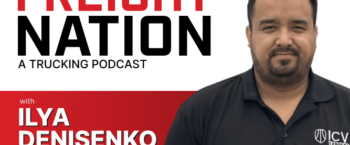How to Switch From Being a Fleet Driver to an Owner-Operator

What are you waiting for?
Make more money starting now.
Working as a fleet driver can be a great way to build your skills when you’re new to trucking. Fleet driving can also be a rewarding long-term career, but some drivers may feel drawn to the owner-operator life.
There are several factors to consider when deciding to leave fleet driving to become an owner-operator, all of which are important to evaluate when making the decision. Learn what to evaluate and gain valuable tips on how to make the transition to becoming a successful owner-operator.
Balancing Benefits and Responsibilities
If you’re independent, self-disciplined, and enjoy the idea of owning your own business, becoming an owner-operator could be a good move. Before shifting gears, be sure to consider the long- and short-term projections of all aspects of the job.
You decide when to work.
Want to take a week off while your kids are on spring break? Looking to pick up some extra short-haul jobs before the holidays? When you’re in charge, you can structure your time however you like (as long as you follow hours-of-service requirements).
If traveling and seeing the country is one of your goals, you can look for jobs that take you to or near some of your bucket-list destinations and spend a few days exploring between jobs.
You have fewer rules to follow.
Fleet owners might define what you can wear while driving, but as an owner-operator, you can wear whatever you want. When you’re independently employed, you can also travel with whomever you want — a friend, your spouse, or your dog.
You earn all the money.
Fleet drivers get a paycheck based on an hourly wage or salary, not based on the cost of a job. That’s because employers have to earn money to be profitable, so their drivers won’t earn as much as an owner-operator performing the same job.
You pay self-employment taxes.
When you’re a fleet employee, your employer withholds taxes from your paycheck and matches your mandatory contributions to Social Security and Medicare. As an OO, you are responsible for estimating and paying your own taxes, including your full contributions for Social Security and Medicare.
You’re responsible for compliance.
Fleets ensure their drivers are compliant by tracking and reporting hours of service, verifying insurance credentials, and so on. Owner-operators must keep up with their own compliance and reporting requirements.
You pay for your own fuel.
Fuel costs are usually the biggest expense associated with being an OO, and can range from $50,000 to $70,000 per year.
You maintain your truck.
Fleets have dedicated technicians to keep trucks up and running, but as an owner-operator, you’re responsible for maintaining your truck. And if your truck ends up in the shop for major repairs or maintenance, you won’t be able to work during that time.
You have to find your own work.
As an OO, you have to find your own jobs. You can rely on a load board for help and should also be growing a network of business contacts that will help keep your schedule full.
You are financially responsible.
You can develop a business plan to ensure profitability if you can cover all your business expenses, such as fuel, maintenance, subscriptions, food, and lodging. However, if funds are limited, particularly during the initial stages of setting up your business, you might face challenges if you can’t handle the costs of unexpected truck breakdowns or ongoing fixed expenses.
You handle all of the business aspects.
All administrative duties, including invoicing, insurance, marketing, taxes, etc., are your responsibility. It’s easy to let maintenance schedules and other tasks slide, but doing so could be costly down the road. You must be prepared to monitor every detail closely or outsource using technology to avoid oversights.
Leasing vs. owning
If your budget makes it difficult to buy a truck, look into leasing. With leasing, you can often get a newer vehicle without committing to a long-term loan — and if you decide the owner-operator life isn’t for you, you won’t be stuck trying to sell your truck. Before deciding, you must determine what type(s) of freight you plan to haul and which equipment or truck specs will be necessary.
Preparing to make the switch
If the pros of being an owner-operator outweigh the cons and you’re seriously considering making the switch, these next steps can help prepare you for success.
Make a business plan.
Turning a profit doesn’t just happen. You need to carefully map out your goals and how you plan to achieve them. This includes an honest evaluation of your financial resources and what you’ll need to bring in to make a profit.
To be a successful owner-operator, you also need to make sure you have all the essential items in place to run your business legally and ethically.
These include:
- Applying for an EIN
- Opening a business checking and savings account
- Purchasing all necessary insurance
- Get all required licenses and permits to operate legally
Check your credit score.
Whether you plan to lease or buy a truck, your credit score can significantly impact the terms of your truck loan or lease.
You’ll find interest rates more favorable for a truck loan if your credit score is at least 670. Having a lower credit score doesn’t mean you can’t get a loan, but you could be subject to interest rates nearing 35%, which means you’d pay a lot more for your truck than the asking price over the life of the loan.
Here’s an example that shows how interest rates affect total ownership costs when financing $50,000 over 60 months:
Interest rate of 7%
Monthly payment: $990.06
Total interest paid: $9,403.55
Interest rate of 22%
Monthly payment: $1,380.95
Total interest paid: $32,856.52
Take a business class.
Taking a business class is a good idea if you’ve never owned a business. You can learn about topics like estimating and paying taxes, how to remain profitable, and what costs you’ll need to account for.
Explore professional resources.
Look into becoming a member of OOIDA and other professional organizations for owner-operators so you can access resources like insurance discounts, equipment rebates, classes specific to trucking, and updates on legislation that could affect your business.
Find a mentor.
Even if you already have fleet driving experience, it’s helpful to have a mentor when starting out as an owner-operator. Look for mentorships online through professional organizations, nonprofits, and community forums.
The road to success starts with Truckstop
Truckstop is the load board owner-operators trust to find work from reliable brokers, compare rates, and manage administrative tasks. Find the best-paying loads and choose where you want to go with Truckstop.

Find out how our platform gives you the visibility you need to get more done.
Get helpful content delivered to your inbox.
Schedule a demo.
Find out how our platform gives you the visibility you need to get more done.





